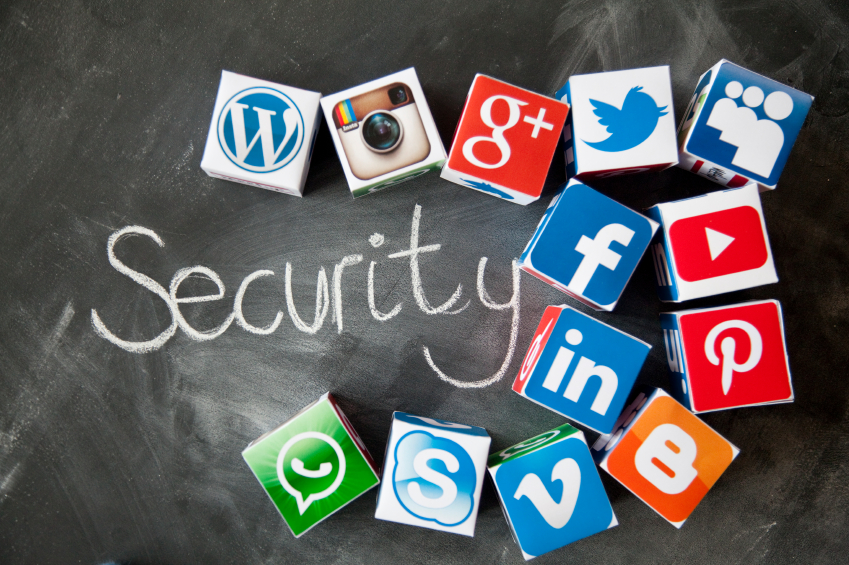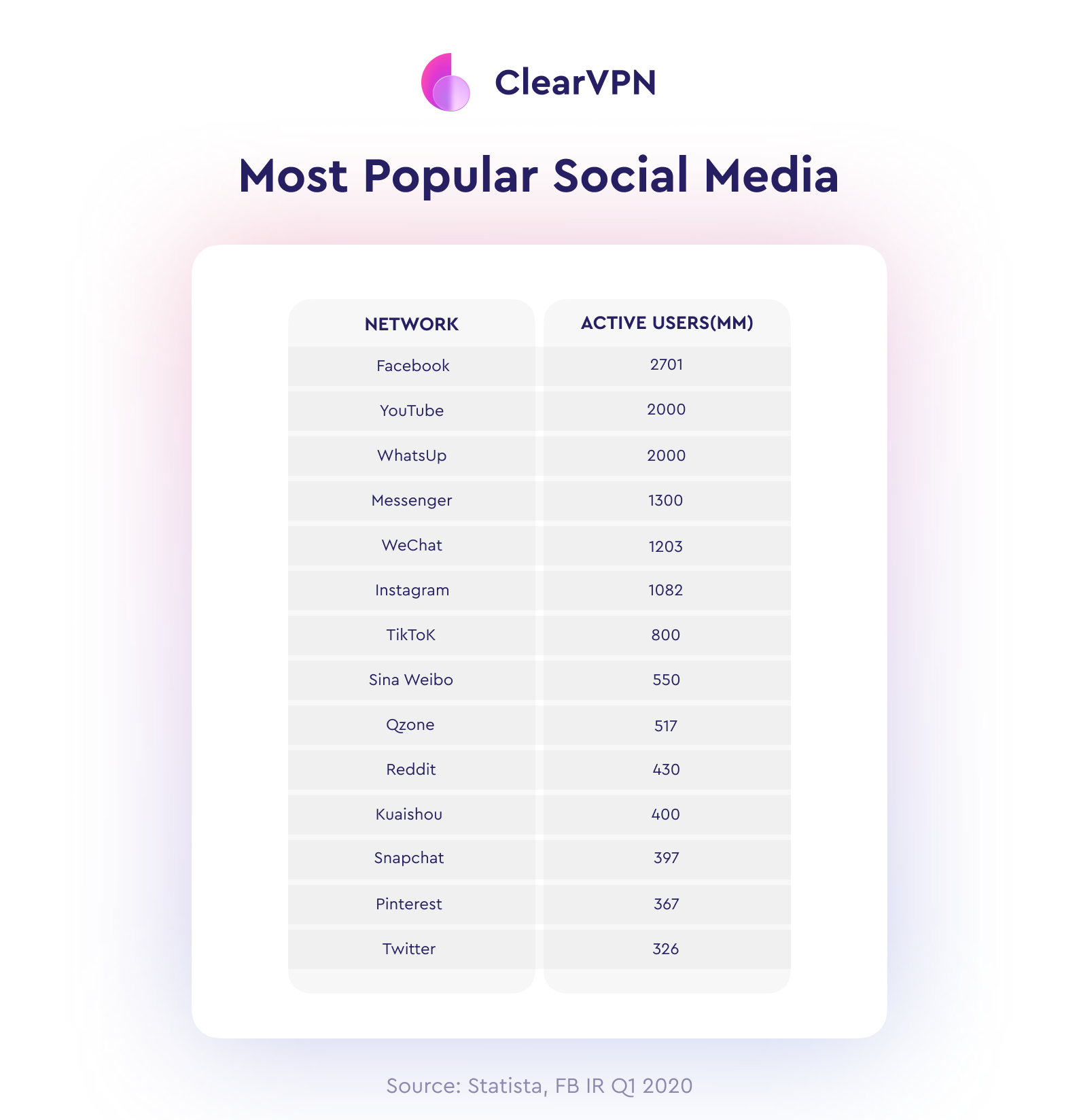Social
media
apps are one of the biggest threats to data privacy on the web. Let’s examine how social media sites and apps handle your personal information.
 Social media is a big part of our lives. Many of us use multiple social media apps every single day. They provide us with endless information, entertainment, and ways to socialize. But there’s a darker side to social media as well. While our favorite sites and apps make it easy for us to stay engaged and entertained online, they also make it incredibly difficult to stay safe digitally. A big time digital threat to your safety is the issue of privacy abuse.
Social media is a big part of our lives. Many of us use multiple social media apps every single day. They provide us with endless information, entertainment, and ways to socialize. But there’s a darker side to social media as well. While our favorite sites and apps make it easy for us to stay engaged and entertained online, they also make it incredibly difficult to stay safe digitally. A big time digital threat to your safety is the issue of privacy abuse.
Since the arrival of early social networking sites in the early 2000s, online social networking platforms have expanded exponentially, with the biggest names in social media in the mid-2010s being facebook , instagram , twitter and snapchat. The massive influx of personal information that has become available online and stored in the cloud has put user privacy at the forefront of discussion regarding the data base's ability to safely store such personal information. The extent to which users and social media platform administrators can access user profiles has become a new topic of ethical consideration, and the legality, awareness, and boundaries of subsequent privacy violations are critical concerns in advance of the technological age.
Facebook, instagram, twitter, and eight other of the most commonly used social media platforms collect up to 19 types of personal data as well as location data of their users, according to hong kong's privacy watchdog. The office of the privacy commissioner for personal data on tuesday released a report after reviewing the privacy settings of facebook, facebook messenger, instagram, line, linkedin, skype, twitter, wechat, whatsapp, and youtube. The office found that all these platforms, with the privacy policy in place, collect between 12 and 19 types of personal data of users. They also collect user location data, including precise and coarse locations.
Strong passwords, two-factor authentication and good cyber hygiene will keep your personal information protected while browsing popular social media accounts. By susan alexandra apr 04, 2019 social media plays a vital role in our daily life. Websites like facebook, twitter, and instagram are the most common social channels used to connect with our loved ones. With over 2. 77 billion social media users today, such social media websites make a perfect platform for identity thefts. With huge user database of private information, it is the responsibility of social media platforms to keep personal information safe. Last week, news circulated regarding the most commonly used social media website “facebook” that stored “hundreds of millions” of account passwords and left them unencrypted.
3 Ways That Social Media Knows You Better Than Your Friends and Family Do
According to a new study from viasat savings , nearly 50% of those surveyed keep their social media accounts in private mode, while the remaining half chose to be public and open. In addition, many people are keeping social media accounts and the accompanying apps as a form of convenience.
 "different generations view social media differently," said autumn knowles, residential and business telecommunications specialist at viasat savings. "for example, when we asked people why they keep an app rather than delete it, most respondents agreed that it was to stay in touch with friends and family," knowles added. "only genz respondents were more likely to keep certain apps because they use them to log into other online accounts.
"different generations view social media differently," said autumn knowles, residential and business telecommunications specialist at viasat savings. "for example, when we asked people why they keep an app rather than delete it, most respondents agreed that it was to stay in touch with friends and family," knowles added. "only genz respondents were more likely to keep certain apps because they use them to log into other online accounts.
Research also reveals that people visit different social media platforms to achieve different things. Gwi’s survey reveals that messaging friends and family is a particularly popular topic on facebook, but that tiktok users aren’t really all that interested in this functionality. Instead, tiktok users primarily visit the platform to look for funny and entertaining videos. Meanwhile, users on instagram and snapchat are particularly interested in publishing their own content, but this activity is significantly less popular on tiktok, reddit, and linkedin. And marketers may like to know that pinterest users are particularly interested in following or researching brand-related content on the world’s most popular online pinboard.
Internet has changed the way we shop, communicate and socialize. It made the world fit into the screen of our computer and opened avenues of communication that did not exist previously. Social media sites are especially popular. They created a way of communicating with friends and family on a daily basis, in a way that did not exist, by sharing photographs, anecdotes and media. They also created a way of advertising services and promoting business and bringing people together based on some shared element (e. G. Opinions, likes and dislikes), all of which made the world a smaller place.
More Social Media Topics
Earlier this year, we launched digital 2020 – our latest set of global digital reports, which showed that privacy concerns remain front of mind for internet users around the world. Here, globalwebindex ‘s strategic insights analyst, olivia valentine examines the role of privacy on social media and why it matters to users, platforms and brands, alike. Unlike topics and trends that come and go, data privacy remains an ever-important issue for internet users around the world. And while these concerns aren’t new, users are growing warier as society becomes increasingly data-driven, and as stories in the media reiterate the worth of personal information.
Threats to Privacy on Social Media
Sarah mcmeekin , co-editor in chief september 21, 2021 with the growth of social media, the act of companies utilizing personal information in order to sell advertising has become less of a scandal and more of a common occurrence. This phenomenon has been brought to the public eye through documentaries, such as netflix’s the social dilemma, and high-profile lawsuits, including those against tiktok and facebook. Although this breach of privacy is well known, the number of users continues to increase, showing the strength of society’s dependence on social media. In order to join the social media network, users trade privacy for relevant feeds and the ability to create online connections.
1. Log onto facebook and click on "settings" 2. Then select "privacy settings" there, you can change your profile access to control who views your posts and who cannot. You can choose to share your posts and contact information with your facebook friends, and not the general public (be careful about adding your address, email and phone number on any social media site for public viewing in the first place, unless you have a business you're promoting). That will stop potential identity thieves from viewing your facebook account. For most items, you can choose to share items with everyone, friends of friends, and friends.
Content and other public information (such as an author profile) is shared on our website and services, including via email digests and social media feeds, and is accessible to the general public. If you choose to use our website and services to communicate directly with a company or individual, such communication may be shared accordingly. Readership information is provided to publishing law firms and companies and authors of content to give them insight into their readership and to help them to improve their content. Our website may offer you the opportunity to share information through our website, such as through facebook's "like" or twitter's "tweet" button.
When it comes to teens, social media and privacy statistics inform us that those between the ages of 16 and 24 are most likely to engage in activities that could negatively affect them. In spite of being the most prominent internet users, younger adults are less careful about internet privacy. They tend to put up photos and engage in contact with strangers.
Social Media Privacy Issues in 2020
The extant information management literature highlights the asymmetric distribution of power between users and online platforms, while the issues related to the stewardship of personal data on such platforms remain problematic and largely unresolved. To address that lacuna, we propose a conceptual design that can help to overcome many of the challenges related to storage, analysis, and integrity associated with the stewardship of personal data on online platforms. We adopt a systemic perspective and propose a shift from the current user-platform relationship to one in which users control the level of access to their data, organisations are relieved from the burden of maintaining personal data, and the data are not decoupled from information about their provenance and context of origin.
Last year, apple’s upgrade to its iphone operating system allowed users to shut down data harvesters’ ability to track them across their many apps. It was a refreshing change, providing customers with power and agency over their data. It also bit hard into companies that rely on cross-app tracking: it cost the major social media sites $10 billion in lost revenue in the second half of 2021. Facebook’s parent company, meta, expects it will cost another $10 billion to them alone in 2022. Apple has made privacy protection a market differentiator: device manufacturers and app developers now use privacy features to draw new users.
Private tech companies gather tremendous amounts of user data. These companies can afford to let you use social media platforms free of charge because it’s paid for by your data, attention, and time. Big tech derives most of its profits by selling your attention to advertisers — a well-known business model. Various documentaries (like netflix’s “the social dilemma”) have attempted to get to the bottom of the complex algorithms that big tech companies employ to mine and analyze user data for the benefit of third-party advertisers. This article will help you better understand what information is being collected by tech companies, how it’s being used, and how you can protect your privacy online.
Users should carefully review and control the information to be viewable publicly on social media platforms. Sensitive personal information, such as id number, residential address, phone numbers and financial information, etc. , should be kept private. Users should: make good use of the privacy settings of social media tools to fine-tune the permission to control to whom they intended to share; review the data shared online regularly and remove them if no longer necessary; and customise the privacy settings with reference to the official guideline pages. Twitter: https://help. Twitter. Com/en/safety-and-security#ads-and-data-privacy.



0 Comments